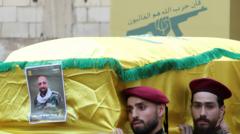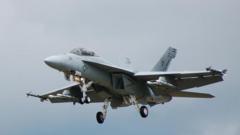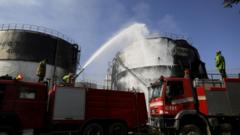In an exclusive CBS News interview, ex-Israeli intelligence personnel disclosed how Hezbollah was misled into purchasing rigged walkie-talkies and pagers from a fictitious Israeli front company. This operation culminated in deadly explosions across Lebanon in September 2024, raising ethical concerns and accusations of war crimes.
Ex-Israeli Operatives Detail Covert Attacks on Hezbollah with High-Tech Explosives

Ex-Israeli Operatives Detail Covert Attacks on Hezbollah with High-Tech Explosives
Two former Mossad agents reveal shocking tactics employed in a surprise attack on Hezbollah, involving rigged communications devices.
Two former Israeli intelligence agents have shed light on a covert operation that targeted Hezbollah, revealing how they were duped into acquiring Israeli-made, explosive-laden walkie-talkies and pagers over a decade. The agents, identified as Michael and Gabriel in a CBS News interview, detailed the strategic manipulation that led to the deployment of these devices, which were detonated in a surprise attack on September 17, 2024. The blasts resulted in significant casualties, with dozens killed and thousands injured, raising alarms and criticism from both Lebanon and the United Nations regarding the legality and ethics of the operation.
According to Michael, the scheme involved disguising explosive devices within the batteries of communication equipment, which Hezbollah inadvertently purchased in bulk from a fraudulent company established by Mossad. “We create a pretend world,” Michael stated, noting how they used complex structures of shell companies to insulate the operation from Israeli identification.
The operation extended to pagers two years ago, leveraging Hezbollah's procurement of this technology from a Taiwanese firm. Gabriel explained that they developed advertising campaigns to further convince Hezbollah of the legitimacy of their purchases. The pagers were designed to create an urgency, prompting users to check messages, resulting in devastating consequences when detonated.
In the wake of these explosions, panic tore through areas heavily populated by Hezbollah supporters, overwhelming local hospitals with casualties. International reactions were swift and critical. The UN's human rights chief condemned the tactic as a war crime, emphasizing that it violated both humanitarian and human rights law.
Following the attacks, Israel ramped up its military operations against Hezbollah, leading to a declaration of ceasefire by both parties on November 26. As the repercussions of this op reveal complex geopolitical dynamics, the approach taken by Mossad raises critical discussions about the ethical boundaries of intelligence operations and their impact on civilian populations.

















